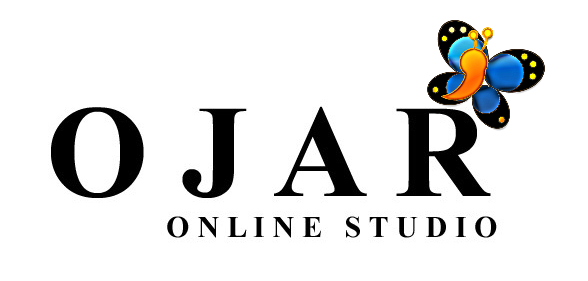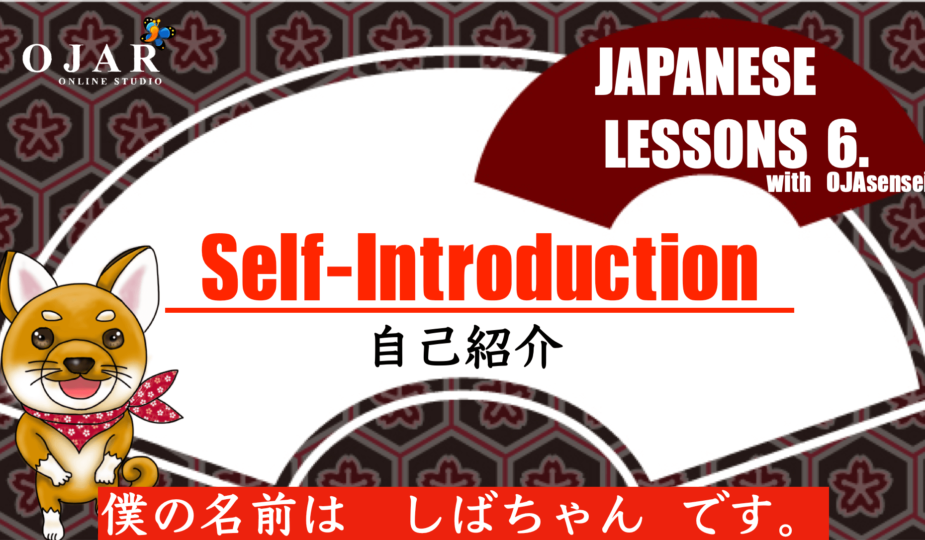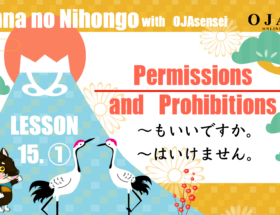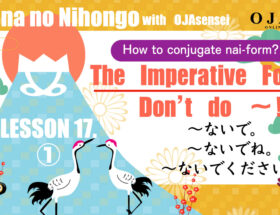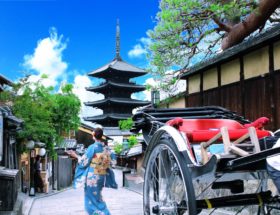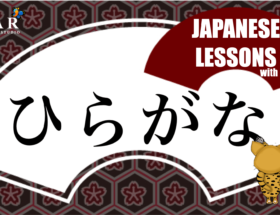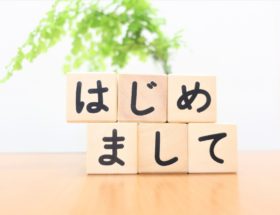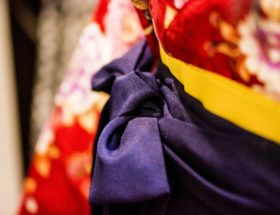Hi, ojachan is here. 😄 Today’s lesson is: Japanese Lesson 6: How to Introduce Yourself in Japanese!
Don’t you want to know how to learn Japanese like Japanese kids? This lesson is meant for students that are beginners at Japanese.
You want to have a good impression for the person who you meet right? Here is your tips to have a good conversation with Japanese people!
Let’s get started!
*MINNA NO NIHONGO,VOL.1-W/CD*
| Amazon Reviews: | ★★★★★ |
|---|
Publisher:3 A corporation (2nd Edition)
CONTENTS
挨拶 Greetings
We use greetings proper time or situations.
“挨拶 aisatsu” means greetings. We have much education when you see someone not to be rude at the school.
■ 4 a.m. to 11 a.m.
・Politely
おはようございます
ohayougozaimasu
Good morning.
・Casually
おはよう
ohayou
Morning.
■ 11 a.m. to 6 p.m. (until darkness)
こんにちは
konnichiwa
hello
■ 6 p.m to 4 a.m.
こんばんは
konbanwa
Good evening.
■ For the first time
You can use this when you meet someone at the first time!
You can use it for daily conversation, business, and various scene.
はじめまして
hajimemashite
How do you do?
You can use this when you meet somebody at the first time as greeting.
・Politely
どうぞ、宜しく お願いします。
ouzo yoroshiku onegai shimasu
Nice to meet you.
We use this greeting for the last part in the conversation.
・Casually
よろしく!/ よろしくね。
yoroshiku yoroshikune
Nice to meet you.
よろしく can give an impression you’re a cheerful guy. While よろしくね can give an impression you’re a kind person.
You can learn more about the difference of Keiogo and greetings!
名前 Name
There are several ways to introduce yourself in Japanese. I’m going to introduce you various expressions for each scenes.
私の名前は おじゃる です。
watashi no namae wa ojaru desu
My name is OJAR.
わたしは おじゃる です。
watashi wa ojaru desu
I’m OJAR.
・Politely
私の名前は おじゃる と申します。
watashi no namae wa ojaru to moushimasu
I’m OJAR.
申します is one of Keigo, 謙譲語 kenjougo. You can use this polite expression if you meet the business partner, customers or your girlfriend’s family.
おじゃちゃん と呼んでください。
ojachan to yonde kudasai
Call me Ojachan.
・Casually
おじゃちゃんって 呼んで。 / おじゃちゃんって 呼んでね。
ojachan tte yonde / ojachan tte yondene
Call me Ojachan.
出身 Hometown
When you see somebody, maybe you may introduce your “出身 shusshin hometown”.
You can learn how to say where you come here.
わたしは 日本人 です。
watashi wa nihonjin desu
I am Japanese.
| 日本語 | Pronunciation | English |
|---|---|---|
| アメリカ人 | amerika-jin | Amerikan |
| アラブ人 | arabu-jin | Arabian |
| イギリス人 | igirisu-jin | English |
| イタリア人 | itaria-jin | Italian |
| インド人 | indo-jin | Indian |
| ドイツ人 | doitsu-jin | German |
| スペイン人 | supein-jin | Spanish |
| フランス人 | furansu-jin | French |
| フィリピン人 | firipin-jin | Phillipino |
| マレーシア人 | mareeshia-jin | Malaysian |
わたしは 日本から 来ました。
watashi wa nihon kara kimashita
I came from Japan.
わたしは 日本 生まれ、東京 育ちです。
watashi wa nihon umare toukyou sodachi desu
I was born in Japan, and I grew up in Tokyo.
職業 Occupation
You may often introduce what you do as your occupation.
・If you are a student
わたしは 大学生 です。
watashi wa daigakusei desu
I’m a university student.
| 日本語 | pronunciation | English |
|---|---|---|
| 学生 | gakusei | student |
| 大学院生 | daigakuinsei | graduate student |
| 大学生 | daigakusei | university student |
| 高校生 | koukousei | high school student |
| 中学生 | chuugakusei | junior high school student |
| 小学生 | shougakusei | Elementary school student |
You can use this if you want to tell your detail study.
わたしは 大学で 日本語を 専攻しています。
watashi wa daigaku de nihongo wo eenkou shiteimasu
I major in Japanese at my university.
・If you have a job
わたしは 教師です。
watashi wa kyoushi desu
I’m a teacher.
| 日本語 | pronunciation | English |
|---|---|---|
| 経営者 | keieisha | Entrepreneur |
| 会社員 | kaishain | employee |
| 事務員 | jimuin | clerk |
| 販売員 / 店員 | hanbaiin / tenin | salesperson |
| 銀行員 | ginkouin | banker |
| 会計士 | kaikeishi | accouter |
| 弁護士 | bengoshi | lawyer |
| 看護師 | kangoshi | nurse |
| 作家 | sakka | writer |
| エンジニア | enjinia | engineer |
| 操縦士 | soujuushi | pilot |
| 美容師 | biyoushi | hairstylist |
わたしは OJAR会社で 働いています。
watashi wa ojaru-gaisya de hataraite imasu
I’m working for OJAR company.
わたしは 広報部の ウェブプログラマを 担当しています。
watashi wa kouhoubu no web purogurama wo tantou shiteimasu
I’m in charge of a web programming for PR department.
You can learn the detail grammar here!
年齢 と 誕生日 Age and Birthday
You can use these expressions if you want to introduce your ages and your birthday.
・年齢 nenrei age
わたしは 30歳 です。
watashi wa sanjussai desu
I’m thirty years old.
| 日本語 | pronunciation | English |
|---|---|---|
| 18歳 | juuhassai | 18 year-old |
| 19歳 | juukuusai | 19 year-old |
| 20歳 | niju-ssai | 20 year-old |
| 21歳 | nijuu-issai | 21 year-old |
| 22歳 | nijuu-nisai | 22 year-old |
| 23歳 | nijuu-sansai | 23 year-old |
| 24歳 | nijuu-yonsai | 24 year-old |
| 25歳 | nijuu-gosai | 25 year-old |
| 26歳 | nijuu-rokusai | 26 year-old |
| 27歳 | nijuu-nanasai | 27 year-old |
| 28歳 | nijuu-hassai | 28 year-old |
| 29歳 | nijuu-kyuusai | 29 year-old |
| 30歳 | sanju-ssai | 30 year-old |
| 40歳 | yonju-ssai | 40 year-old |
| 50歳 | goju-ssai | 50 year-old |
| 60歳 | rokuju-ssai | 60 year-old |
・誕生日 tanjoubi birthday
わたしは 5月 生まれです。
watashi wa gogatsu umare desu
I was born in May.
you can learn here how to say months!
趣味 Hobbies
Maybe you may want to introduce your hobbies with listener.
・Easy
わたしは 音楽が 好きです。
watashi wa ongaku ga sukidesu
I like music.
| 日本語 | pronunciation | English |
|---|---|---|
| 音楽 | ongaku | music |
| 映画 | eiga | movie |
| スポーツ | supootsu | sport |
| お絵かき | oekaki | drawing |
| 旅行 | ryokou | traveling |
| 語学 | gogaku | studying language |
| 料理 | ryouri | cooking |
| 演奏 | ensou | playing (instrument ) |
| 読書 | dokusho | reading books |
| 散歩 | sanpo | walking |
| 登山 | tozan | climbing |
| ドライブ | doraibu | driving |
・Difficult
わたしは 音楽鑑賞が 趣味です。
watashi wa ongaku-kanshou ga shumi desu
My hobby is listening to music.
| 日本語 | pronunciation | English |
|---|---|---|
| 音楽鑑賞 | ongakukanshou | music appriciation |
| 映画鑑賞 | eigakanshou | watching films |
| 筋トレ | kintore | muscle training |
| 天体観測 | tentaikansoku | stargazing |
| 楽器演奏 | gakkiensou | playing the instrument |
| 温泉巡り | onsen-meguri | hot spring hopping |
| 美術館巡り | bijutsukan-meguri | museum hopping |
| 食べ歩き | tafbearuki | walk and eat tour |
家族 Family
You can talk your “家族 kazoku family” with these expressions.
わたしは 五人家族 です。
watashi wa gonin-kazoku desu
There are 5 members in my family.
| 日本語 | Pronunciation | English |
|---|---|---|
| 一人 | hitori | alone |
| 二人 | futari | two people |
| 三人 | sannin | three people |
| 四人 | yonin | four people |
| 五人 | gonin | five people |
| 六人 | rokunin | six people |
| 七人 | nananin | seven people |
| 八人 | hachinin | eight people |
| 九人 | kunin | nine people |
| 十人 | juunin | ten people |
わたしは 兄と 妹が います。
watashi wa ani to imouto ga imasu
I have an elder brother and a younger sister.
| 日本語 | pronunciation | English |
|---|---|---|
| 母 | haha | mother |
| 父 | chichi | father |
| 兄 | ani | elder brother |
| 姉 | ane | elder sister |
| 弟 | otouto | younger brother |
| 妹 | imouto | younger sister |
| 双子(の) | futago | twin |
わたしは 猫を 飼っています。
watashi wa neko wo katteimasu
I have a cat.
| 日本語 | pronunciation | English |
|---|---|---|
| 動物 | doubutsu | animal |
| 猫 | neko | cat |
| 犬 | inu | dog |
| 鳥 | tori | bird |
| 魚 | sakana | fish |
| ウサギ | usagi | rabbit |
| 馬 | uma | horse |
| 亀 | kame | turtle |
| イタチ | itachi | weaesel |
| ヘビ | hebi | snake |
尋ねる Asking Listener
あなたは どうですか。
anata wa doudesuka
How about you?
■ Asking Name
・casually
名前は 何て 言うの?
namae wa nante iuno
What’s your name?
You can’t use it for elder and superior people.
・Politely
お名前は 何と おっしゃいますか。
onamae wa nanto osshaimasuka
What is your name?
■ Asking Hometown
・Casually
どこから 来たの?
dokokara kitano
Where are you from?
・Politely
お国は どちらですか。
okuni wa dochira desuka
Where is your hometown country?
ご出身は どちらですか。
goshusshin wa dochira desuka
Where is your hometown?
■ Asking Occupation
・Casually
仕事は 何 してるの?
shigoto wa nani shiteruno
What do you do?
・Politely
お仕事は 何を されていますか。
oshigoto wa nani wo sareteimasuka
What is your profession?
・Asking major
専攻は 何ですか。
senkou wa nandesuka
What is your major?
■ Asking Birthday
・Casually
誕生日は いつ?
tanjoubi wa itsu
When’s your birthday?
・Politely
お誕生日は いつ ですか。
otanjoubi wa itsu desuka
When is your birthday?
■ Asking Hobbies
・Casually
趣味 ありますか。
shumi arimasuka
Do you have hobbies?
・Politely
ご趣味は 何ですか。
goshumi wa nandesuka
What is your hobbies?
■ Asking Family
・Casually
何人家族?
nanin kazoku
How many your family members?
何人兄弟?
nannin kyoudai
How many your siblings?
ペット 飼ってる?
petto katteru
Do you have pets?
・Politely
ご家族は 何人 ですか。
gokazoku wa nannin desuka
How many your family members are?
ご兄弟は いらっしゃいますか。
gokyoudai wa irassyaimasuka
Do you have any siblings?
ペットは 飼って いらっしゃいますか。
petto wa katte irasshaimasuka
Do you have any pets?
⭐️When you finish the sentence, you need to write”。” which is called “ 読点to-ten” instead of “period”.
⭐️If you finish your divisions in your writing , you have to write “ 、” which is called “句点ku-ten” instead of “comma”.
⭐️And we usually don’t use “? question mark” in the text. But we often use it in casual sentences.
Let’s Practice
Your Homework
✏️Answer these questions in Japanese and comment to the below.
Introduce yourself in Japanese.
Okay, that’s all for today!
Good luck with your Japanese study 😉
*MINNA NO NIHONGO,VOL.1-W/CD*
| Amazon Reviews: | ★★★★★ |
|---|
Publisher:3 A corporation (2nd Edition)
P.S. My English skill is not enough yet. Please correct me with DM from CONTACT if my English is wrong. Thank you for your cooperation!
Next Lesson is; CLICK HERE!
Japanese Lesson 7: How to Say about the Weather in Japanese
Previous Lesson is; CLICK HERE!
Japanese Lesson 5: Japanese Phonics 3 長音 and 促音
